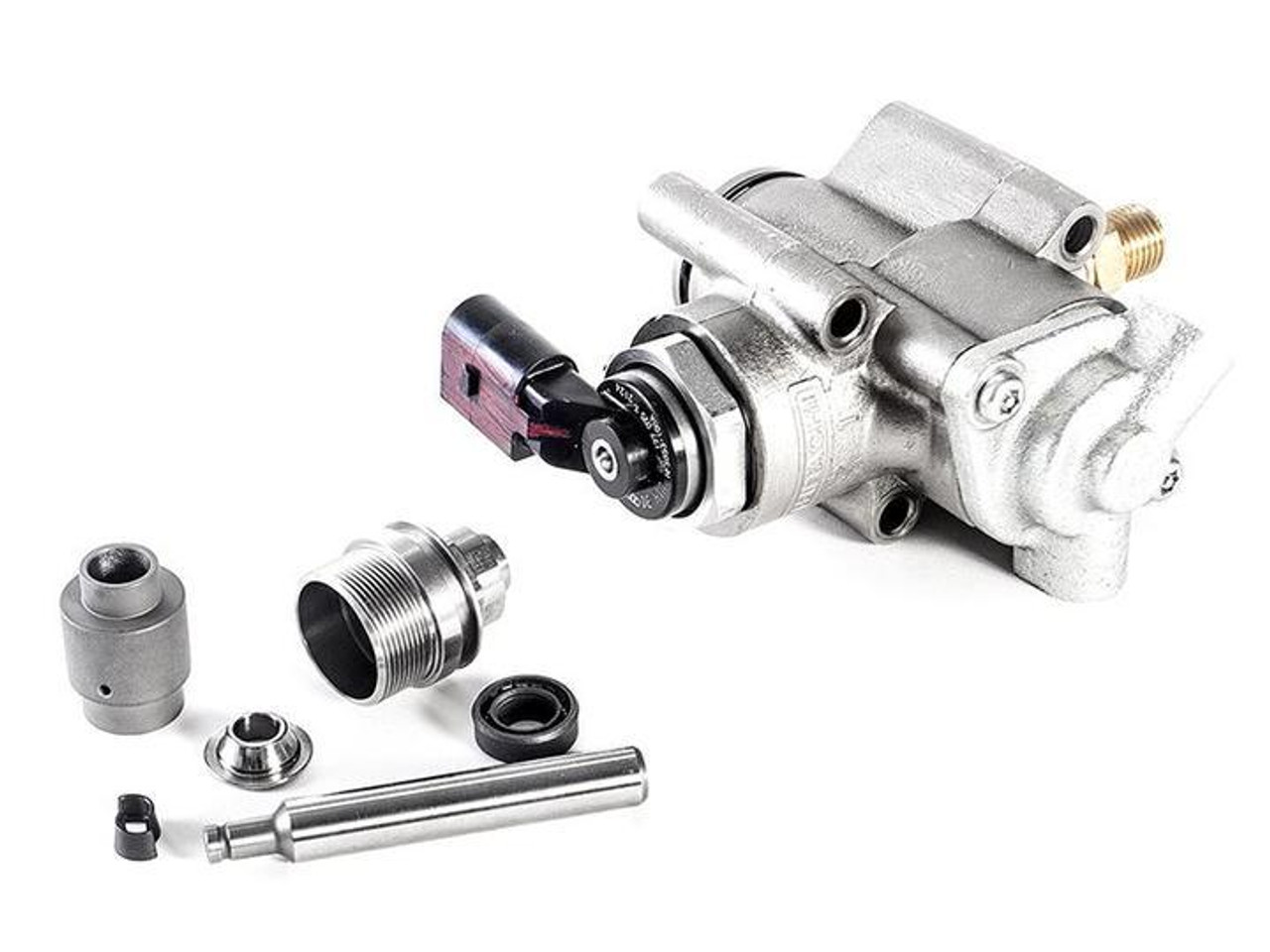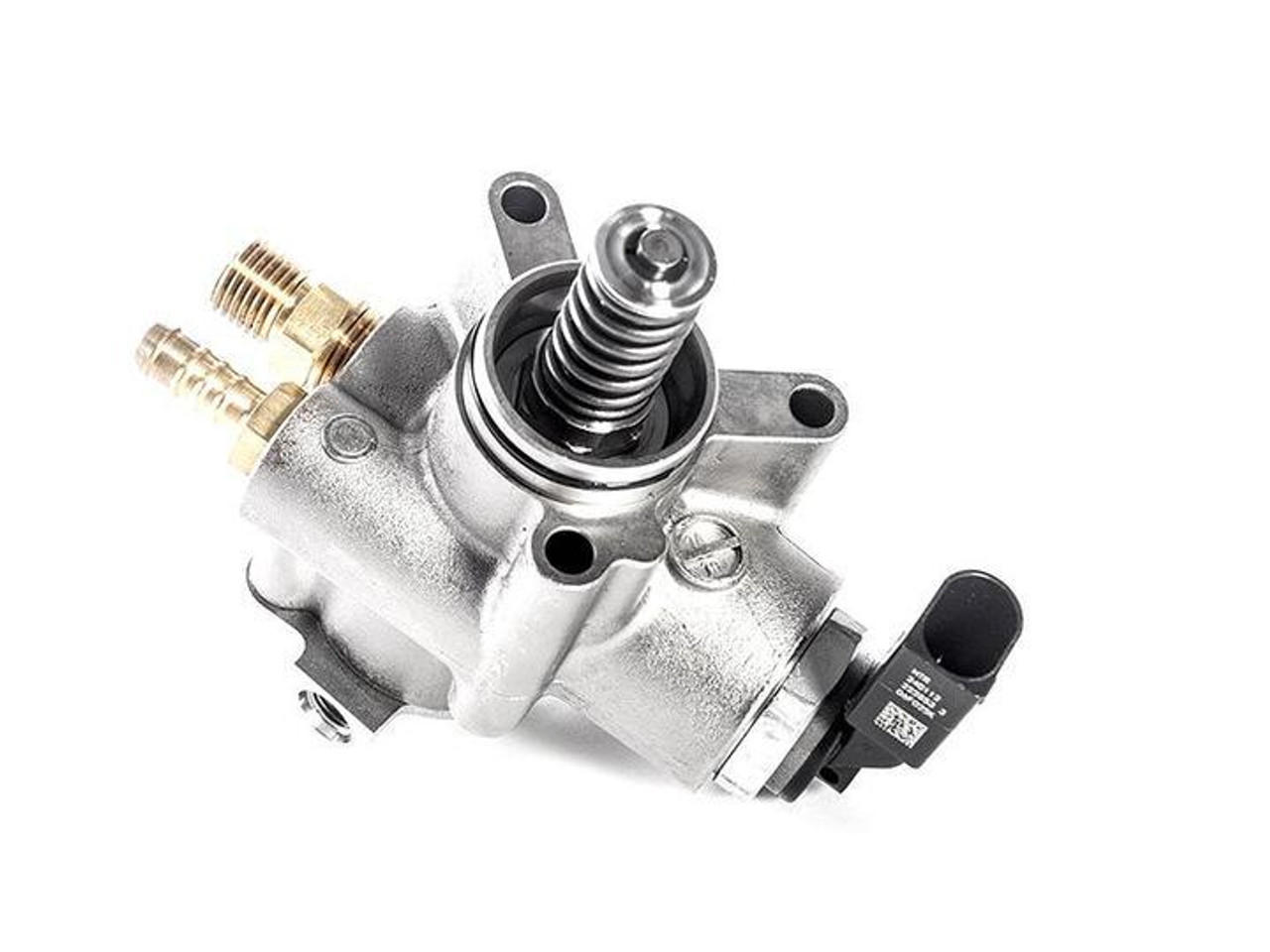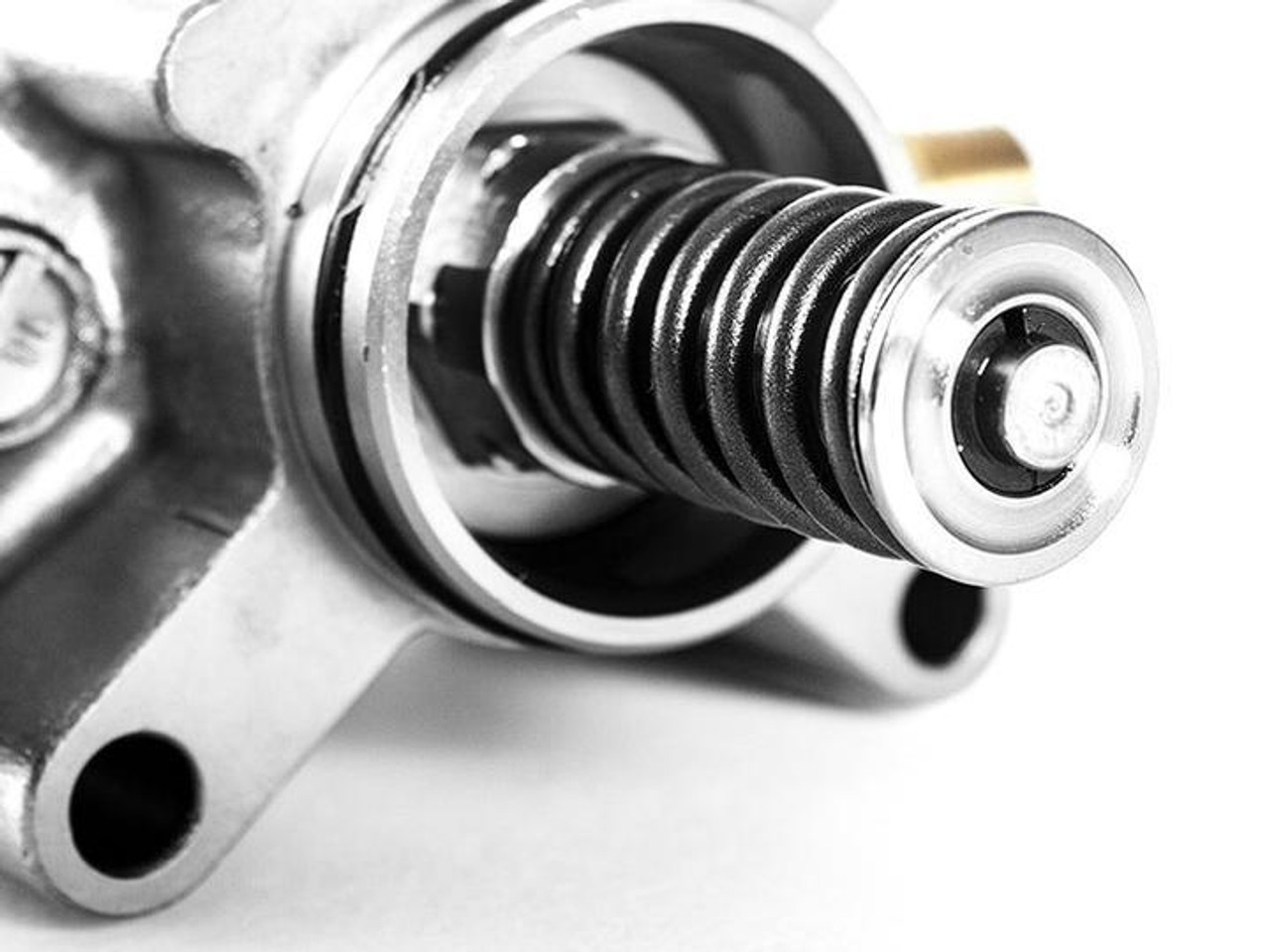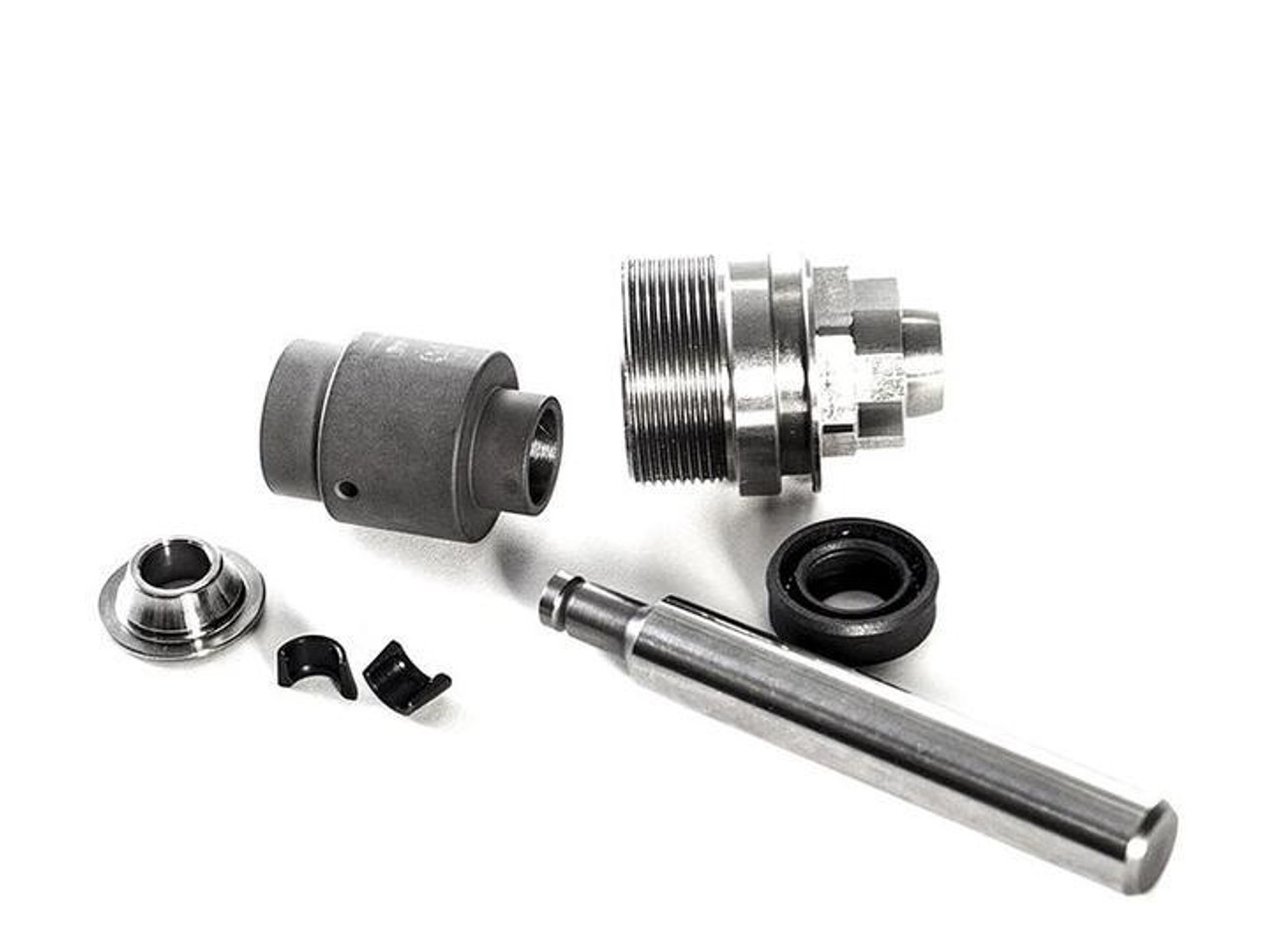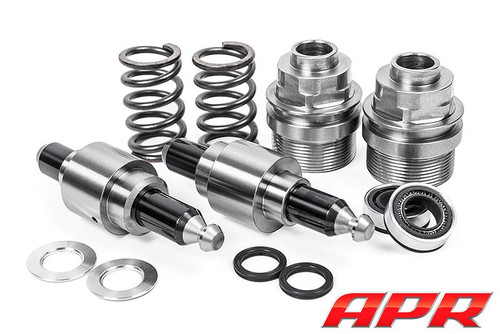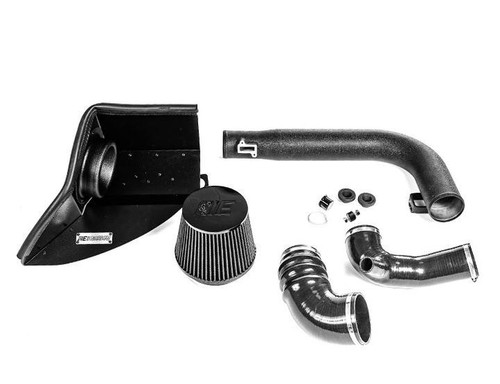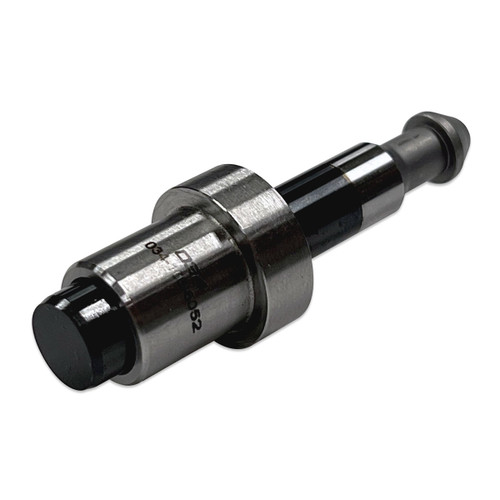Product Description
IE High Pressure Fuel Pump (HPFP) Upgrade Kit for VW & Audi 2.0T FSI & 4.2L FSI Engines
The IE HPFP upgrade reliably increases the output of the OE fuel system delivering 50% more displacement than the factory unit. This is a popular modification for the MK6 Golf R and MK5 GTI as well as many others. This combination offers fueling support for nearly 600hp at 7500rpm required for many ECU tunes and turbo upgrades. This is a necessity for stage 2 & big turbo FSI cars.
Product Features
- Supports Stage 2 and big turbo upgrades
- 50% displacement over OE HPFP
- Powers up to 600HP and 7500 RPM
- Constant diameter piston for long life
- Nitrided surface finish for exact tolerances
- Extreme resistance to wear and abrasion
- Ultralight titanium retainer eliminates valve float
- Retains OE spring to greatly reduce cam follower wear
- Leak-free molybdenum disulphide impregnated seal
- Every kit is tested and verified before shipment
- Engineered, designed, and manufactured in the USA
ORDERING OPTIONS
Pump internal kit only
This is the entry-level HPFP kit for builders who prefer to assemble their HPFP themselves. Each kit includes all the necessary components and a detailed install sheet to get the job done.
Complete new pump
This option is for engine builders looking to purchase a complete new pump with the IE HPFP internals installed and ready to run. We use only NEW factory pumps for these builds. This method offers the shortest time from purchase to install, as we ship you out a pump that drops right in place of your factory one.
INCLUDED WARRANTY
Due to the extreme machining tolerances and precise assembly practices, Integrated Engineering offers a limited warranty on this product:
6 Months from the day of purchase/Unlimited Miles for Internal Kits
18 Months from the day of purchase/Unlimited Miles for Rebuild Service and Complete New Pumps
TECHNICAL INFORMATION
Increased displacement
The high-pressure fuel pump (HPFP) is a cam-driven fuel pump that provides over 1500psi to the direct injection fuel injectors in your engine. As performance modifications are often desired for the 2.0T FSI engines, more fuel is required to support the added horsepower from larger turbos, ECU tunes, and other power-increasing modifications. By increasing the bore of the cylinder, we were able to increase HPFP output by 50%. That makes our pump capable of near 600hp at 7500rpm. As you can see on the dyno chart to the right, the factory fuel pump is out of fuel much earlier than the IE HPFP. Although it is capable of over 350hp at 7000rpm, it does not provide nearly that much in the lower rpm range where most quicker-spooling setups see peak power numbers. This is a great upgrade for those looking to do a big turbo setup, or even max out the factory turbo at higher boost levels. Our pump will be perfectly calibrated with any ECU calibration which is tuned for a 9.8MM diameter HPFP piston, which is commonly available.
Consistent diameter piston
With rigorous testing behind this product, we have determined that a consistent diameter piston is absolutely necessary. Many other upgrade kits available use a piston that steps down to a smaller diameter. They do this because it allows them to use the original seal and nut assembly. However, doing this means that less than 1/2 of the cylinder is guiding the pin at the top of the stroke. This greatly increases wear, leakage past the pin, and decreases the stability of the pin riding in the cylinder. Additionally, using a stepped cylinder causes a pumping action on the bottom side of the piston, which pulses fluid against the shaft seal, increasing the possibility for leakage into the cam follower region. With our consistent diameter piston, as with factory design, there is no displacement change occurring on the bottom side of the piston, so there are no pressure pulses against the shaft seal.
Nitrided piston and cylinder
From the factory, the OEM HPFP includes a nitrided piston and cylinder. This is done to harden the parts significantly, reducing wear and keeping them within wear tolerances. Nitriding is not a coating, but rather a process in which Nitrogen atoms are infused into the atomic structure of the outer surface of the component. This increases its surface hardness and wear properties drastically. We have adopted this technology for the IE HPFP as it has proven to be reliable for thousands of miles and cannot chip or flake off like coated components. The thickness and composition of this Nitride layer are independently verified in a materials testing lab for each production batch.
Proprietary alloy
The material that the components are made from is very critical, which is why we chose to use a proprietary tool steel alloy for the piston and pin. The material we use was specifically chosen for its extreme resistance to wear and abrasion. These are critical factors in a system with marginal lubrication provided only by gasoline.
Spring and retainer
In place of the factory steel spring retainer, the IE HPFP uses an ultra-lightweight titanium retainer. Just like a valve spring and retainer, less weight is better, as it reduces the chance of valve float happening. Our retainer was carefully FEA optimized and features a deep weight reduction groove on the outer surface. We also maintain the factory spring, as we have tested them to over 8000 rpm with zero valve float. Other pumps available use an unnecessarily stiffer spring, which puts more pressure on the follower and causes an unnecessary increase in cam follower wear.
Custom seal
The IE HPFP uses a molybdenum disulphide impregnated seal, which increases the stiffness and reduces friction on the seal. Along with this, our custom seals are spring energized to keep them sealing throughout their life with no concern of wearing and leaking. Many of the other HPFP kits on the market reuse the factory seal, which can easily be damaged when the internals are installed. That often causes fuel to leak past the seal and into the crankcase.
Precise assembly
To ensure that every complete pump leaves our facility ready to install, we assemble them in a clean environment within a Laminar flow hood, keeping contaminants away from components. Like a brain surgeon in an operating room, we take the assembly of precise components serious.
Tested before shipping
We run each one of our HPFP kits on our fuel pump dyno before shipping. This is done to break-in all components and as a final quality control step. Our custom-built dyno is fitted with a motor to drive the pump exactly as if it were installed on a running FSI engine! With special electronics onboard, we are able to monitor fuel pressure and rpm, which allows us to collect data and prepare the pumps for install.
Proudly made in the USA
These pumps are manufactured in-house, right here in Salt Lake City. Once the components are made, they go through a very strict quality control process before heading over to our clean room for assembly.
INSTALLATION GUIDE
Assembly of the high-pressure fuel pump internals is rather straightforward requiring basic tools and a bench vise. The internals and pump must be assembled in an extremely clean environment to eliminate the possibility of any contaminants on the high tolerance pump internals.
ENGINE APPLICATION GUIDE
| Make | Model | Years | Engine | Notes |
| Volkswagen | MK5 | 2005-2010 | 2.0T FSI EA113 | Timing belt driven |
| Volkswagen | Golf R (MK6) | 2012 | 2.0T FSI EA113 | Timing belt driven |
| Audi | A4 (B7) | 2005-2008 | 2.0T FSI EA113 | Timing belt driven |
| Audi | A4 (B8/B8.5) | 2009-2016 | 2.0 TFSI EA113 | Timing belt driven |
| Audi | TT (8J) | 2008-2015 | 2.0T FSI EA113 | Timing belt driven |
| Audi | TTS (8J) | 2008-2015 | 2.0T FSI EA113 | Timing belt driven |
| Audi | A3 (8P) | 2008-2013 | 2.0 TFSI EA113 | Timing belt driven |
| Audi | S3 (8P) | 2008-2013 | 2.0 TFSI EA113 | Timing belt driven |
| Audi | RS4 (B7) | 2006-2008 | 4.2L FSI | Requires two pumps |
| Audi | S5 (B8/B8.5) | 2008-2016 | 4.2L FSI | Requires two pumps |

